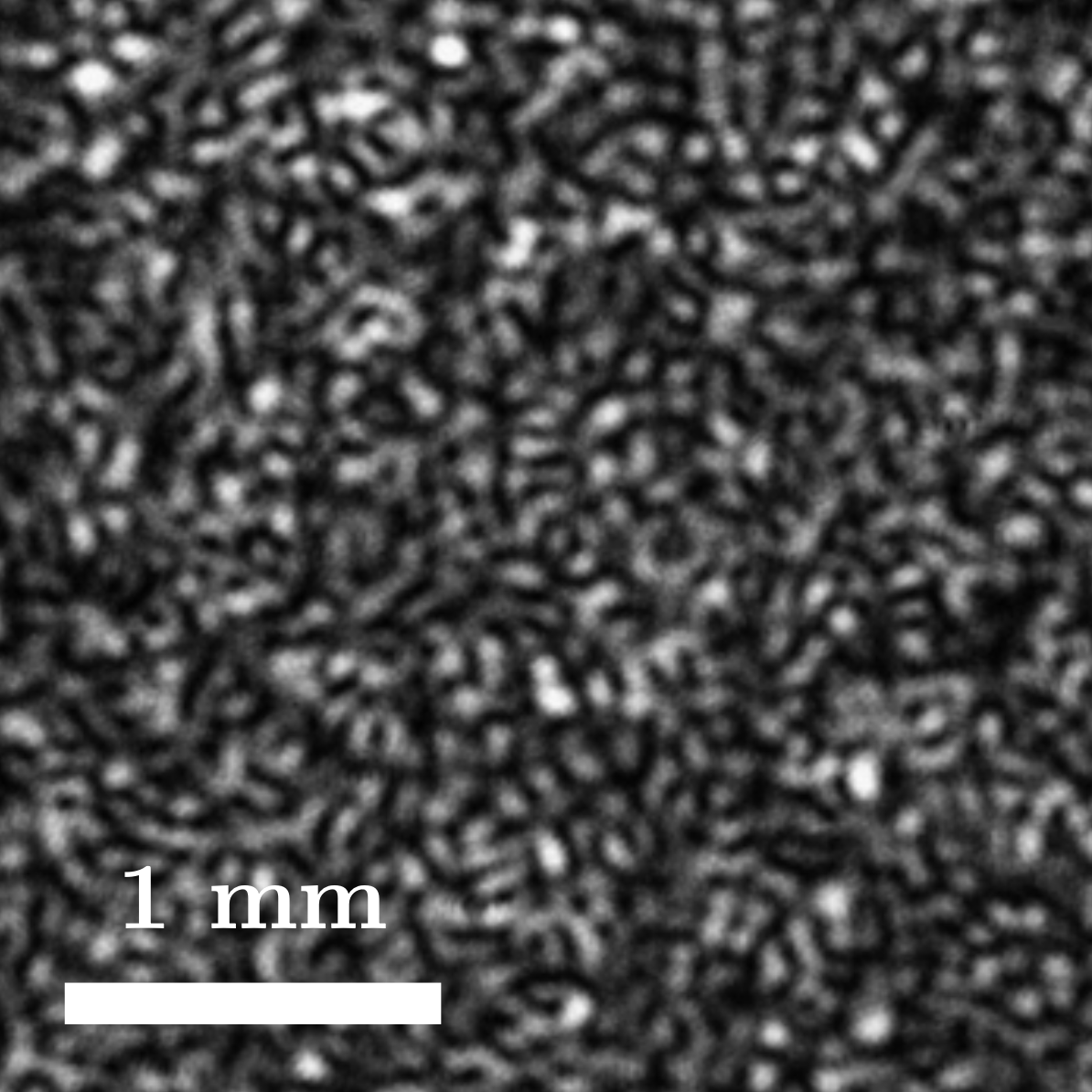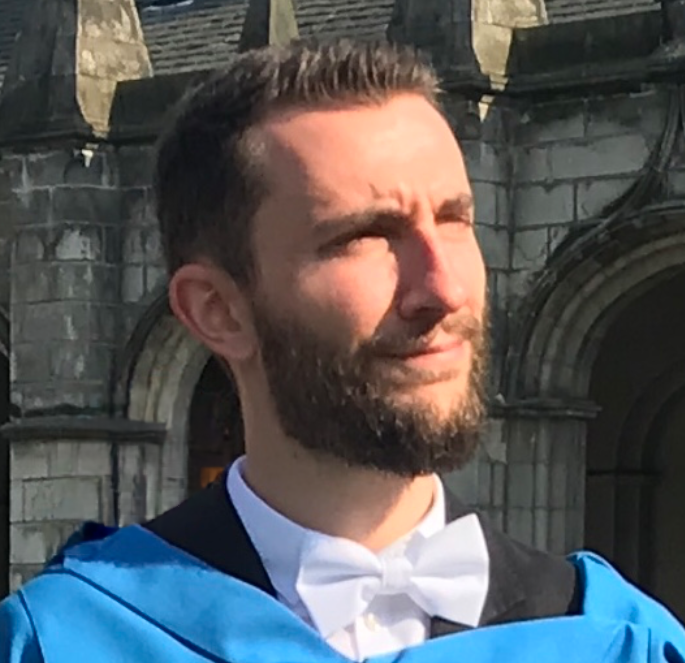I am Morgan Facchin, currently a postdoctoral researcher at the Kastler-Brossel Laboratory in Paris. Here, you can find information about me, my work, my projects, and maybe a few random things. Enjoy!
Optical computing
I recently started working in the field of Optical Computing in the Complex Media group of Prof. Gigan. This is a fascinating topic where light is used to perform computation, rather than standard electronics. More on this soon!Speckle patterns

Speckle patterns are granular intensity patterns that result from the random interference of light. Such patterns appear whenever coherent light is randomised, for example when a laser beam reflects off a rough surface.
This is quite a universal phenomenon, although not easily observable under ordinary conditions due to the lack of coherence of natural light. Since the invention of lasers, however, the production of speckle patterns has become extremely simple, and a whole field of optics has emerged around it, particularly in the domain of metrology.
That was the subject of my PhD, where I did lots of interresting things, like measuring displacements 10 times smaller than an atom, or measuring variations in air density of 1 part in a billion! Find out more in my publications.
Arsenical books

Recently I have been involved in a more applied and quite fun project: detecting Arsenic in old books. In the 1800s, bookbinders used a pigment, Emerald Green, for its deep vibrant green colour. However, Emerald Green contains Arsenic, which is highly toxic. It's not that they didn't know: they also used Emerald Green as an insecticide, at the same period! This pigment was also used in clothes and in wallpaper. Lots of theater actors died from it, from which people inferred a curse. It might even be what killed Napoleon, who liked the colour so much that he painted parts of his house with it.
The presence of arsenic in book covers has been known for a long time, but only recently has it been recognised as a serious health and safety issue. Big national libraries in Germany and France have started to quanrantine thousands of potentially contaminated books, mainly based on visual identification and bibliographic data. However, there is currently no efficent way to instrumentally detect the presence of arsenic. The exsisting techniques (X ray fluorescence or Raman spectroscopy) are slow, require expensive equipment, specialised personel, and data analysis.
My team and I have develloped an optical technique to solve these issues. We implemented this in a prototype that does the analysis automatically and gives a result in about 10 ms. This technique is less accurate than XRF and raman, but identifies toxic books with 100% true positive rate, 0% false negative, and 10% false positive, which is suitable for large scale testing in libraries. Publication in progress!
Quantum Quack

This is a personal project I have been working on with my friend Rafael Kollyfas. Quantum Quack is a website and iOS app that allows one to make quantum decisions. It picks one output in a list of options the user provides, using quantum random numbers, rather than ordinary random numbers. This has fascinating implications that vary depending on the different interpretations of quantum mechanics. Here is a summary for the two main ones, illustrated through the hypothetical and highly relevant example of choosing between an Italian and a Chinese restaurant.
- The Copenhagen interpretation.
This is historically the first dominant interpretation, and is therefore still presented as the standard one in most textbooks. In this interpretation, a quantum measurement "collapses" the quantum state onto one of its possible outcomes. The collapse is fundamentally random, as opposed to ordinary random processes. Indeed, the result of a dice roll for example, appears random to us only because it is a complex process to predict. However, it is in principle perfectly predictable, knowing the laws of mechanics and all the dice’s properties. The randomness here is emergent, not fundamental. All randomness at human scale is of this sort, and in principle every human-scale phenomena are determined in advance, even you reading this text right now! Making a quantum choice then breaks this deterministic chain of events. In other words, if some supernatural intelligence knew everything about the universe at the moment of your birth, it could predict everything about your future life, except if you’re going to that Italian or Chinese restaurant.
In summary: you escape determinism.
- The Everett (or many-worlds) interpretation.
This is a popular interpretation among researchers working on the foundations of physics. In this interpretation, during a quantum process, the state of the universe splits into all possible outputs of the process, called "branches", each of which behaves as an independent universe. The universe then contains two branches, one in which you go to the Italian restaurant, and one in which you go to the Chinese restaurant. Both exist simultaneously in the abstract state space of the universe. If the result turns out to be the Italian restaurant, you can take confort in the idea that, somewhere, you are also enjoying the Chinese restaurant. Lucky you!
In summary: you end up doing all the options at once.
Quantum Quack a website, as well as an iOS app (soon available on other platforms). I host the Privacy Policy here.
Shortcuts are available for common entries, such as yes/no, directions (for quantum exploring), or digits.
Contact me at morgan.facchin@icloud.com
Privacy Policy
Welcome to Quantum Quack. This Privacy Policy explains how we collect and use information when you use our mobile application.
1. Information We Collect
We do not collect any information. The app only uses your device’s camera to capture images in real-time to generate quantum random numbers. The images are processed within the app and are not stored or transmitted to any external servers. The options you enter are not recorded.
2. How We Use Information
The images captured by the device’s camera are used solely for the purpose of generating quantum random numbers. These images are processed locally on your device and are not shared or stored beyond the immediate use.
3. Data Sharing and Disclosure
Quantum Quack does not share, sell, or distribute any user data with third parties. All processing occurs locally on your device, and no data is transmitted to external servers.
